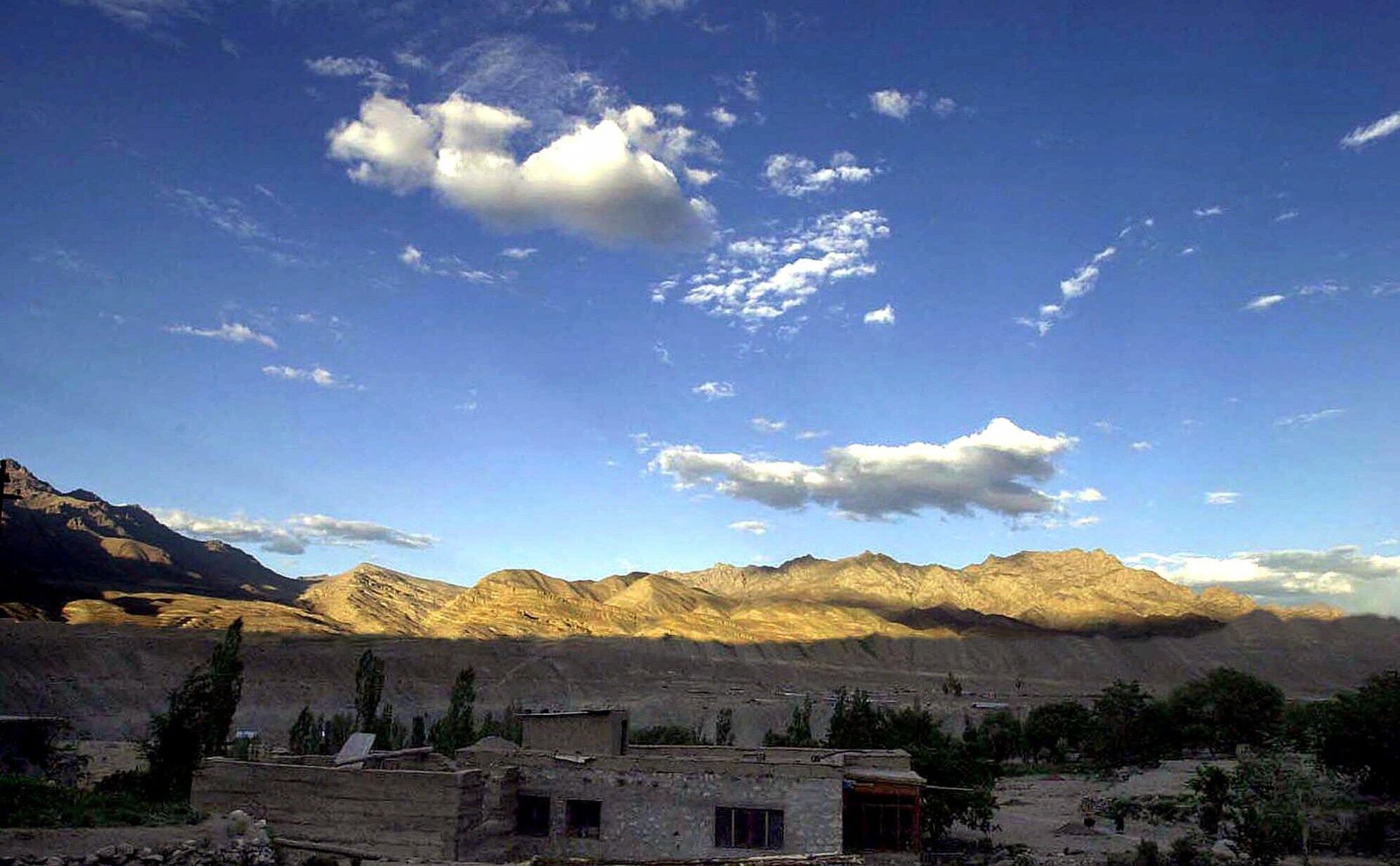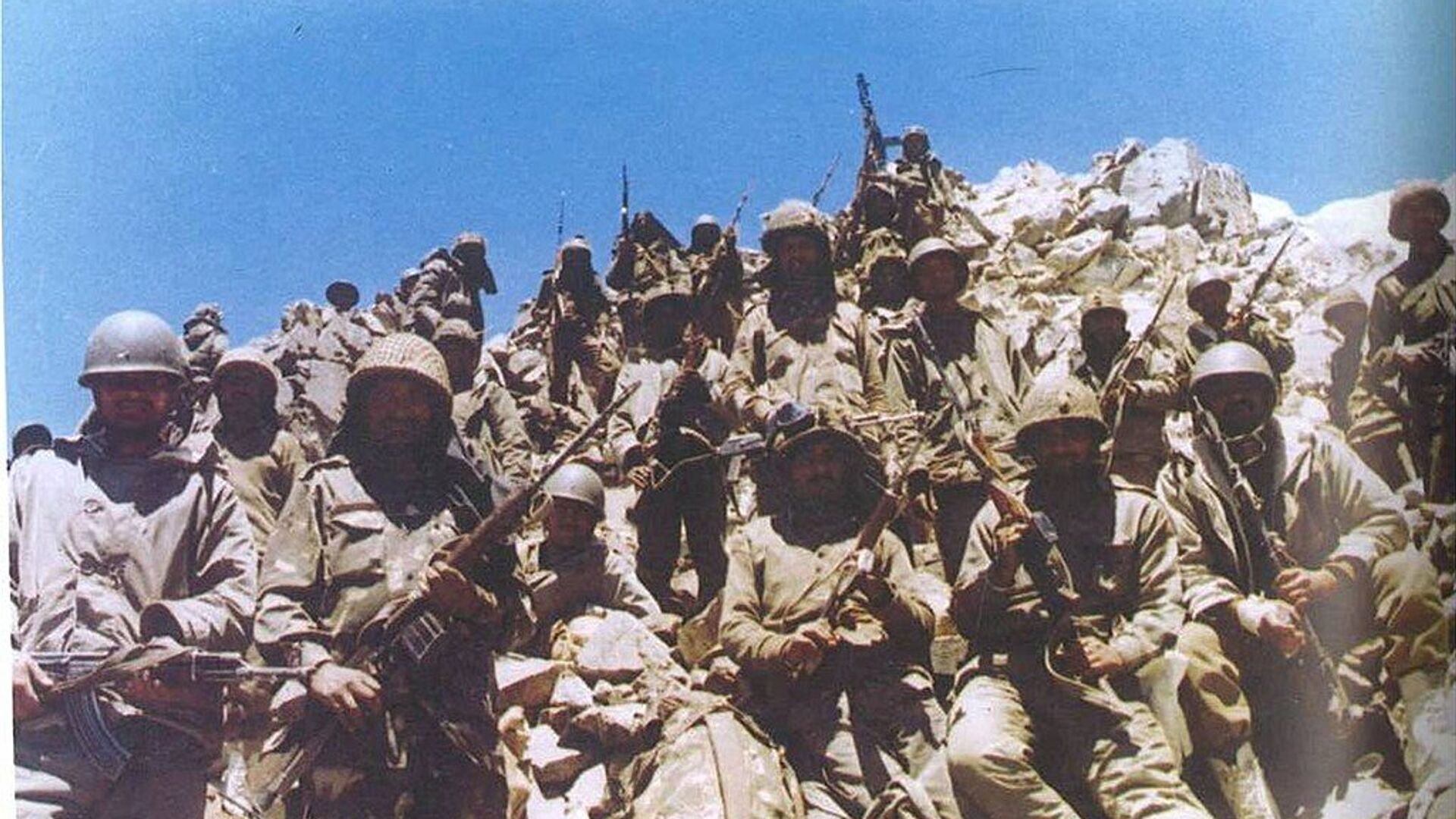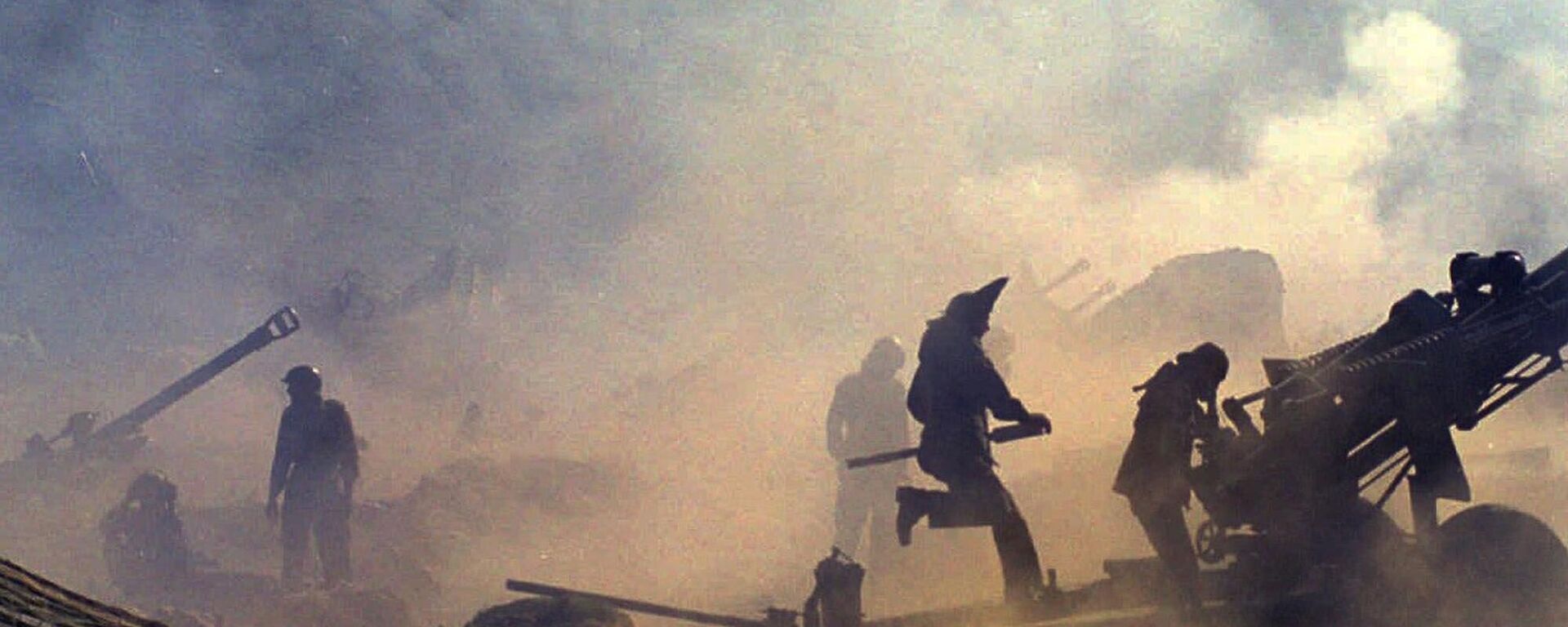https://sputniknews.in/20230726/meet-the-guruji-who-trained-indian-soldiers-for-kargil-war-3204780.html
Meet the 'Guruji' Who Trained Indian Soldiers for Kargil War
Meet the 'Guruji' Who Trained Indian Soldiers for Kargil War
Sputnik India
The "Kargil Vijay Diwas" (Kargil victory day), is commemorated annually on July 26 to mark India's victory over arch-rival Pakistan in the conflict held between the two nations in 1999.
2023-07-26T18:39+0530
2023-07-26T18:39+0530
2023-08-12T08:07+0530
kargil war
india
pakistan
pakistan army
islamabad
delhi
new delhi
indian army
indian air force (iaf)
ladakh
https://cdn1.img.sputniknews.in/img/07e7/07/1a/3206094_0:21:1025:597_1920x0_80_0_0_cf75d8e73c1828fc0fffd666e8421850.jpg
A military veteran, who documented the Kargil War fought between warring neighbors India and Pakistan in 1999, has revealed that Indian soldiers received tremendous support from both Kashmiris and Ladakhis during their operation to recapture mountain heights of the region.What Was the Reason for Kargil War?The Kargil War, also known as Operation Vijay in defense parlance, was an Indian military operation to regain control of the mountain heights in the Kargil region of Kashmir.This came after alleged personnel of the Pakistan Army and the country's paramilitary intruded into Indian-held territory and occupied mountain heights there.With India marking the 24th anniversary of its victory over Pakistan in Kargil, Sputnik spoke with Kargil War historian Colonel Satish Chandra Tyagi (Retd.) who has written many books on the conflict, including the widely acclaimed Kargil Heroes: Ten Exclusive Inspiring Stories.In the interaction, he underlined that intrusion in Kargil happened due to an intelligence failure, besides emphasizing the support the Indian Army received from Kashmiri and Ladakhi locals during their battle with the Pakistani soldiers.Sputnik: You were closely associated with the Kargil War. Having written multiple books on the conflict, you are rightly described as the Kargil War's historian who documented the chain of incidents during the conflict. Could you elaborate on your role in the war?Colonel Tyagi: My role in Kargil was not to fight because I had overgrown that stage. So, I was there as a kind of 'Guruji' who trained soldiers, advised them, and who was raising their morale.As my first posting as an Indian Army officer was in Kargil, I had a lot of attachment to that place, so I volunteered to go to Kargil and meet all the troops who were fighting and motivated them to take on the enemy as I was their training commandant in the core battle school in Kashmir.For instance, one of the battalions fighting on top of Tololing at 18,000 feet was the 2nd Rajputana Rifles. During the operation, the first recapture of a mountain peak by the Indians was Tololing by the aforementioned soldiers.Sputnik: What is the significance of the Kargil Vijay Diwas in independent India's history?Colonel Tyagi: Kargil happened due to a lack of surveillance and intelligence, and we were surprised. But having said that, it showed the tremendous level of courage and resilience of the men of the Indian Army as the Pakistani intruders were evicted from our territory within a short timeframe.Kargil was the kind of battle that the Indian Army fought in the super high altitudes and I believe no other military would have been able to do so as successfully as our troops did.In hindsight, when I say it, it rather made us realize our weaknesses and strengths, transforming the Indian Army into a much stronger force than it was then.Sputnik: How the Kargil War influenced India's western border regions?Colonel Tyagi: Earlier, there was a feeling that Pakistan was only interested in the Kashmir valley. But after this quiet and surprise intrusion by the Pakistan Army personnel, it looked as if Pakistan wanted to cut off the Ladakh-Kargil region from the rest of India.Perhaps Pakistanis thought that by doing so, they would be able to block the national highway which was the only way of transportation to feed our troops serving either in Siachen or in the Ladakh region.When they struck in the close vicinity of the national highway, the perceptions changed drastically and apprehensions began that Pakistan was up for a bigger game.Sputnik: Could you share your experience of the people's reaction, especially Kashmiris toward soldiers who fought in the Kargil War?Colonel Tyagi: As a matter of fact, I was pleasantly surprised that the reaction of the local Kashmiri population after the Kargil War started, was very pro-Indian troops at the time.We had an apprehension that the movement of troops of the Indian Army from Kashmir would probably be hindered or sabotaged during the conflict but nothing of that sort happened. The people in Kashmir supported the Indian soldiers, possibly thinking that how come somebody else was occupying their area.
https://sputniknews.in/20230126/on-republic-day-ex-army-officer-shares-tearful-anecdote-from-kargil-war-640338.html
india
pakistan
islamabad
delhi
new delhi
ladakh
jammu and kashmir (j&k)
kashmir valley
Sputnik India
feedback.hindi@sputniknews.com
+74956456601
MIA „Rossiya Segodnya“
2023
Pawan Atri
https://cdn1.img.sputniknews.in/img/07e6/0c/13/139630_147:0:831:684_100x100_80_0_0_8fa2b25903e7787fe6a2698552c167df.png
Pawan Atri
https://cdn1.img.sputniknews.in/img/07e6/0c/13/139630_147:0:831:684_100x100_80_0_0_8fa2b25903e7787fe6a2698552c167df.png
News
en_IN
Sputnik India
feedback.hindi@sputniknews.com
+74956456601
MIA „Rossiya Segodnya“
Sputnik India
feedback.hindi@sputniknews.com
+74956456601
MIA „Rossiya Segodnya“
Pawan Atri
https://cdn1.img.sputniknews.in/img/07e6/0c/13/139630_147:0:831:684_100x100_80_0_0_8fa2b25903e7787fe6a2698552c167df.png
kargil vijay diwas, kargil vijay diwas 2023, who won the kargil war, kargil war, india pakistan kargil war, india pakistan war 1999, how many indian soldiers died in kargil, what was the reason of kargil war, was kargil part of pakistan, kargil war tololing battle, kargil war historian, kargil war kashmiri support, kargil war ladakhi support, indian army kargil war, kargil war indian army, indian army kargil war, kargil war indian army,
kargil vijay diwas, kargil vijay diwas 2023, who won the kargil war, kargil war, india pakistan kargil war, india pakistan war 1999, how many indian soldiers died in kargil, what was the reason of kargil war, was kargil part of pakistan, kargil war tololing battle, kargil war historian, kargil war kashmiri support, kargil war ladakhi support, indian army kargil war, kargil war indian army, indian army kargil war, kargil war indian army,
Meet the 'Guruji' Who Trained Indian Soldiers for Kargil War
18:39 26.07.2023 (Updated: 08:07 12.08.2023) Exclusive
The "Kargil Vijay Diwas" (Kargil victory day), is commemorated annually on July 26 to mark India's victory over arch-rival Pakistan in the conflict held between the two nations in 1999.
A military veteran, who documented the Kargil War fought between warring neighbors India and Pakistan in 1999, has revealed that Indian soldiers received tremendous support from both Kashmiris and Ladakhis during their operation to recapture mountain heights of the region.
What Was the Reason for Kargil War?
The Kargil War, also known as
Operation Vijay in defense parlance, was an Indian military operation to
regain control of the mountain heights in the
Kargil region of Kashmir.
This came after alleged personnel of the
Pakistan Army and the country's paramilitary intruded into Indian-held territory and occupied mountain heights there.
With India marking the 24th anniversary of its victory over Pakistan in Kargil, Sputnik spoke with Kargil War historian Colonel Satish Chandra Tyagi (Retd.) who has written many books on the conflict, including the widely acclaimed Kargil Heroes: Ten Exclusive Inspiring Stories.
In the interaction, he underlined that intrusion in Kargil happened due to an intelligence failure, besides emphasizing the support the Indian Army received from Kashmiri and Ladakhi locals during their battle with the Pakistani soldiers.
Sputnik: You were closely associated with the Kargil War. Having written multiple books on the conflict, you are rightly described as the Kargil War's historian who documented the chain of incidents during the conflict. Could you elaborate on your role in the war?
Colonel Tyagi: My role in Kargil was not to fight because I had overgrown that stage. So, I was there as a kind of 'Guruji' who trained soldiers, advised them, and who was raising their morale.
I had raised the core battle school in Kashmir and was training soldiers for counter-terrorism operations. All the battalions which came to Kashmir were getting trained under my supervision.
As my first posting as an Indian Army officer was in Kargil, I had a lot of attachment to that place, so I volunteered to go to Kargil and meet all the troops who were fighting and motivated them to take on the enemy as I was their training commandant in the core battle school in Kashmir.
For instance, one of the battalions fighting on top of Tololing at 18,000 feet was
the 2nd Rajputana Rifles. During the operation, the first recapture of a mountain peak by the Indians was Tololing by the aforementioned soldiers.
All the officers, who were part of the battle, including Captain Vijayant Thappar, who played a key role in the recapture of Tololing, were trained by me in Kashmir.
Sputnik: What is the significance of the Kargil Vijay Diwas in independent India's history?
Colonel Tyagi: Kargil happened due to a lack of surveillance and intelligence, and we were surprised. But having said that, it showed the tremendous level of courage and resilience of the men of the Indian Army as the Pakistani intruders were evicted from our territory within a short timeframe.
Kargil was the kind of battle that the Indian Army fought in the super high altitudes and I believe no other military would have been able to do so as successfully as our troops did.
In hindsight, when I say it, it rather made us realize our weaknesses and strengths, transforming the Indian Army into a much stronger force than it was then.
Sputnik: How the Kargil War influenced India's western border regions?
Colonel Tyagi: Earlier, there was a feeling that Pakistan was only interested in the Kashmir valley. But after this quiet and surprise intrusion by the Pakistan Army personnel, it looked as if Pakistan wanted to cut off the Ladakh-Kargil region from the rest of India.
Starting from the Zojila pass to Turtuk village which lies close to the Line of Control (LoC, the de-facto border between India and Pakistan in Kashmir), there was hardly any presence of the Indian Army there. Never in history any large-scale intrusion had taken place. An odd person intruding or some local person crossing over from the other side was the only thing that had occurred in the past.
Perhaps Pakistanis thought that by doing so, they would be able to block the national highway which was the only way of transportation to feed our troops serving either in Siachen or in the
Ladakh region.
When they struck in the close vicinity of the national highway, the perceptions changed drastically and apprehensions began that Pakistan was up for a bigger game.
Sputnik: Could you share your experience of the people's reaction, especially Kashmiris toward soldiers who fought in the Kargil War?
Colonel Tyagi: As a matter of fact, I was pleasantly surprised that the reaction of the local Kashmiri population after the Kargil War started, was very pro-Indian troops at the time.
We had an apprehension that the movement of troops of the Indian Army from Kashmir would probably be hindered or sabotaged during the conflict but nothing of that sort happened. The people in Kashmir supported the Indian soldiers, possibly thinking that how come somebody else was occupying their area.
Talking about Ladakh, the Ladakhis took it in the sense that Pakistan had invaded their land. Ladakhi Buddhist Association even contributed volunteers, with principals of schools in the region asking the youth or every able-bodied man to do their volunteering work with the Indian Army and carry loads by acting as porters to the men who were engaged in battle up on the hills.




